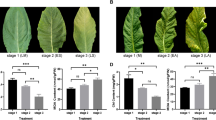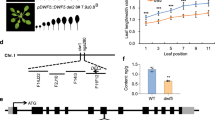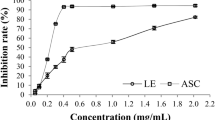Abstract
THE senescence and yellowing of detached leaves and leaf disks of many plants are retarded by low concentrations of kinetin. Gibberellic acid (GA) and indolyl-3-acetic acid (IAA) may also induce a similar response, depending on the age of the leaf and the species. Thus, mature leaves of dandelion (Taraxacum officinale) respond to low concentrations of kinetin and GA, but scarcely at all to IAA; whereas in banana (Musa cavendishii Lamb.) all three types of hormone are effective in retarding leaf senescence. Leaves of the broad-leaved dock (Rumex obtusifolius) are unusual in responding only to gibberellin, and this has been made the basis of the bioassay technique described in this report.
This is a preview of subscription content, access via your institution
Access options
Subscribe to this journal
Receive 51 print issues and online access
$199.00 per year
only $3.90 per issue
Buy this article
- Purchase on SpringerLink
- Instant access to full article PDF
Prices may be subject to local taxes which are calculated during checkout
Similar content being viewed by others
References
Nicholls, P. B., and Paleg, L. G., Nature, 199, 823 (1963).
Author information
Authors and Affiliations
Rights and permissions
About this article
Cite this article
WHYTE, P., LUCKWILL, L. A Sensitive Bioassay for Gibberellins based on Retardation of Leaf Senescence in Rumex obtusifolius (L.). Nature 210, 1360 (1966). https://doi.org/10.1038/2101360a0
Published:
Issue date:
DOI: https://doi.org/10.1038/2101360a0
This article is cited by
-
v301, a new allele of BRITTLE CULM 12, and its regulation of the early senescence of the leaf blade in rice
Acta Physiologiae Plantarum (2020)
-
DELLA proteins negatively regulate dark-induced senescence and chlorophyll degradation in Arabidopsis through interaction with the transcription factor WRKY6
Plant Cell Reports (2018)
-
Effect of exogenous hormones on leaf yellowing in cut flowering branches of Alstroemeria pelegrina L.
Plant Growth Regulation (1992)
-
The effects of gibberellic acid on photosynthetic pigments and oxygen evolution inChlamydomonas andAnacystis
Biologia plantarum (1992)
-
Effect of exogenous hormones on leaf yellowing in cut flowering branches of Alstroemeria pelegrina L.
Plant Growth Regulation (1992)



